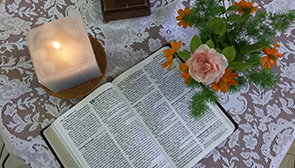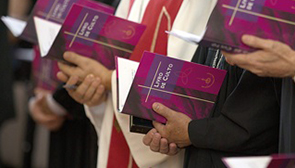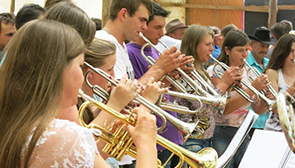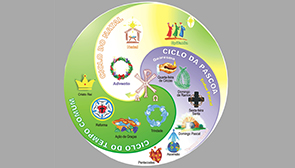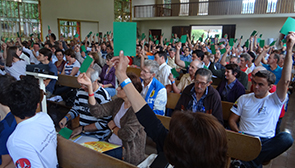
Bible Study 23
Mariéli Saft - Theology Student, Gender and Religion Program - Faculdades EST/IECLB
Theologian: Ketlin Lais Schuchardt, Gender Research Group – Faculdades EST
Text: (Mc 10:7-8); (Ef 5: 22-24); - Sola Scriptura - Elisabeth Herzogin von Rochlitz.
Tranlation: Marcia Blasi.
Sola Scriptura
“Wives, be subject to your husbands as you are to the Lord. 23 For the husband is the head of the wife just as Christ is the head of the church, the body of which he is the Savior. Just as the church is subject to Christ, so also wives ought to be, in everything, to their husbands.” (Ephesians 5:22-24)
‘For this reason a man shall leave his father and mother and be joined to his wife, and the two shall become one flesh.’ So they are no longer two, but one flesh”. (Mark 10:7-8)
On October 31, the heir churches of the Protestant Reformation of the XVI century celebrate the Reformation day, which has four pillars: Solus Christus (only Christ), Sola fide (only Faith), Sola Scriptura (only Scripture) and Sola Gratia (Grace only). In this study, we will relate the story of Elisabeth Herzogin von Rochlitz to the Scripture-only principle.
In Lutheran understanding, the Bible is the most important record of the Word of God, because it is through the word that Christ becomes alive again, proclaims the Kingdom of God and guides our lives. In the Gospel is the revelation of God in Christ, therefore, a revelation of God's grace, love and mercy. For this reason, all the confessional basis of the Lutheran Church, all doctrine, all preaching and sacramental practice are based on the Gospel itself.
Scripture, therefore, bears the word of God. However, not everything in the Bible
can be interpreted as the Word of God. There is a fundamental criterion: Scripture is only the word of God when interpreted in the light of Christ and when it promotes it. This means that for us, Jesus Christ is the center, the criterion of the whole Word. Every word that does not meet this criterion is understood as a law, whose function is none other than to point out and denounce sin.
Because of this awareness, Luther and his collaborators, worked hard to make Scripture accessible to people in their time. Translating the Bible into the language of the people and enabling it to reach their homes and hands, also meant the need to deal with another serious problem in their day, education.
The difference that biblical knowledge makes in a person's life can be seen in the story of the reformer Elisabeth Herzogin von Rochlitz (1502-1557). During her marriage to Count Johann, she lived at the Catholic court in Dresden. As a supporter of the Reformation movement, she wrote more than a thousand letters trying to maintain peace between royal Catholic and Lutheran courts. His father-in-law Duke George, who commanded the court in Dresden, where Elisabeth lived, accused her of acting as a spy in his court. Due to the conflicts, she refused to attend Holy Communion. Her father-in-law demanded that her husband compel her to participate, using the biblical word that a woman should be submissive to her husband as an argument. Elisabeth, however, contested her husband by arguing that the biblical word also says that the husband should leave father and mother and join his wife. But he remained under his father's command, rather than acting autonomously.
This was how Elisabeth discovered the word of deliverance, of salvation, in the Bible. As in the past, even today biblical texts are used to argue and impose the existence of a superiority of men over women, of the domination of the masculine over the feminine. Through human hands, the Bible has been used both for liberation and for oppressing groups of people in different times and places. But do unequal relationships promote Christ? Does dividing people between submissive and subjugators refer to Jesus' testimony? What is the criterion used to interpret texts that, in practice, result in relations of injustice, submission and violence? Law or Gospel?
In the Latin American and Caribbean context, popular reading of the Bible and feminist hermeneutics help women and men to understand the Bible as a living word. Both start from the daily life of women, their experiences, reality and the context in which they are inserted. These readings and interpretations of the biblical texts allow a new look, a renewed and hopeful look, a look of dignity, acceptance, a look that brings the Word of God closer to the need of every moment of life, a consoling look, a look of strength, a look of courage, look of faith, look of love.
1. How do you feel the word of God in your daily life? Has it helped you to overcome difficulties?
2. In what texts in the Bible do you recognize similarities with your own life experience? Which character do you identify with?
Prayer: Divine Ruah we thank you, because you gift us each new day with the chance to live new knowledge, to risk new paths, to meet new people and ways to follow. It also allows us to make mistakes and regret what we sometimes do what does not promote you and does not correspond to what you expect from us. Help us again and again to seek the example of Jesus to guide our choices and live our experiences. Let us know that you always accompany us and love us unconditionally, and that each of our experiences is valid and important to you. Make us always seek your word and let it mold us and, through us, spread your signs of love, justice and dignity to all people.
It is in the name of your Son Jesus Christ that we pray together: Our Father ...
Blessing:
God's blessing,
the blessing of the Son, born of Mary;
the blessing of Spirit Ruah of love,
who cares of us with affection, like a mother, friend, sister takes care of us,
be with each and every one of us. Amen


